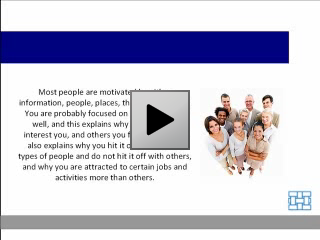 |
| Are You Motivated By Information, People, Activities, Things-or Places? |
| By: Harrison Barnes |
 |
|
|
 |
 |
Employment Research Institute's Chief Executive Officer, A. Harrison Barnes, in a webinar as he analyzed how everybody is motivated differently and how depending on this motivation, there is an information person, people person, activities person, material person or a places person.
An information person is the rarest personality type and enjoys spending his time learning, investigating and reflecting. They need to be in work environments that allow them to think and solve problems. Another rare type of people is the places people. They are interested in locations and spaces and where things occur. Such people are concerned with working in places they like, the convenience and the basic feel of the place where they are working, its physical attributes and geographical surroundings. The person-centered person in quite common and is wholly focused on learning and talking about other people. It is important for these people to work where they can interact with other people, where morale is good, and where they can spend time with their coworkers both inside and outside of work. An activities person is interested in doing things all the time. They love movement and need a job where the responsibilities involve lots of action and movement and less of idle activity. Lastly, the object-oriented people love to purchase, collect and exchange things. They tend to want things only because they want to have them–not necessarily because they need them. These people need to be in jobs which make the best of their interests. For instance they could sell things or explain their value.
Harrison believes that the frustration you may have felt in your job may be directly related to whether or not you were in an environment that supported and nourished your interests. You need to understand that people are typically motivated by one of these elements or another and it explains why certain people, jobs and places interest you and others do not. Your relationships will remain successful as long as you understand these differences and act accordingly. |
|


